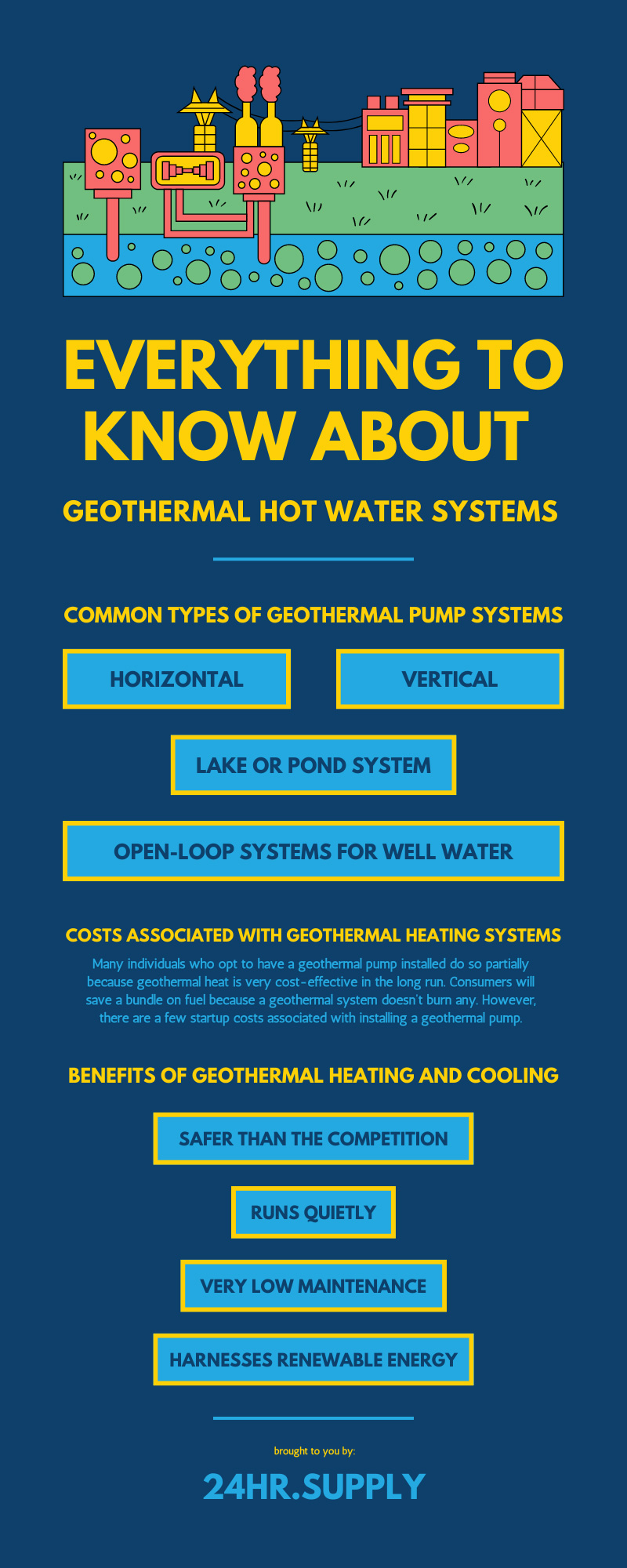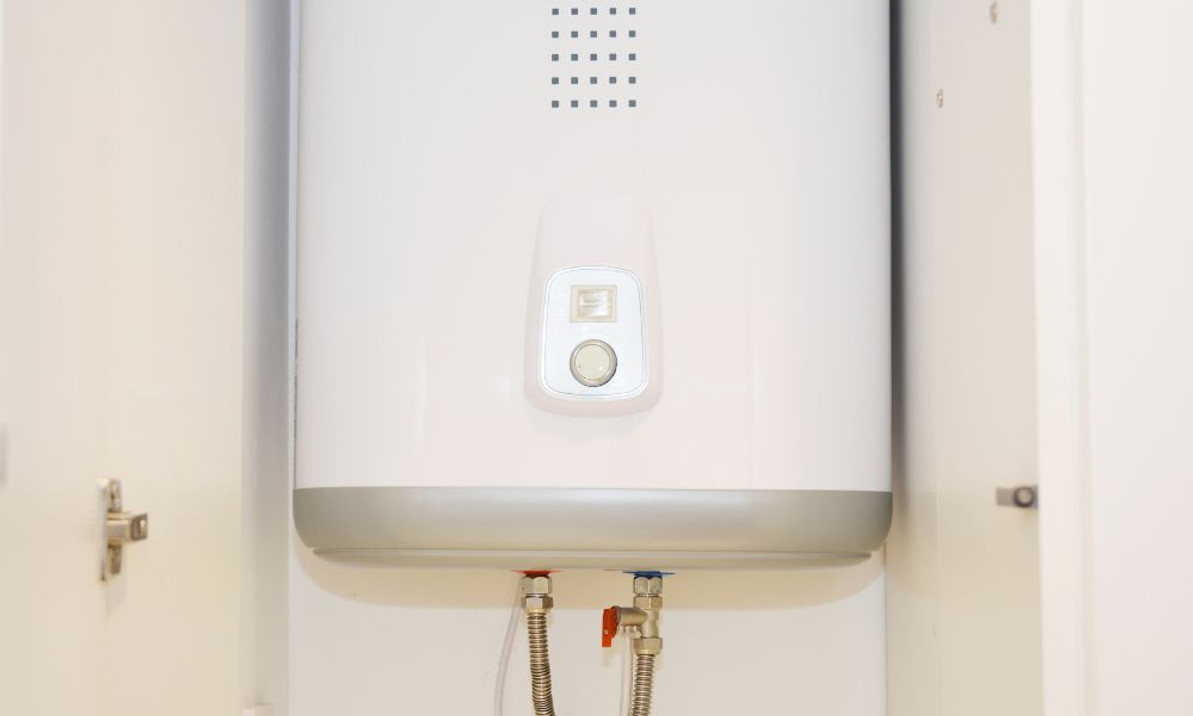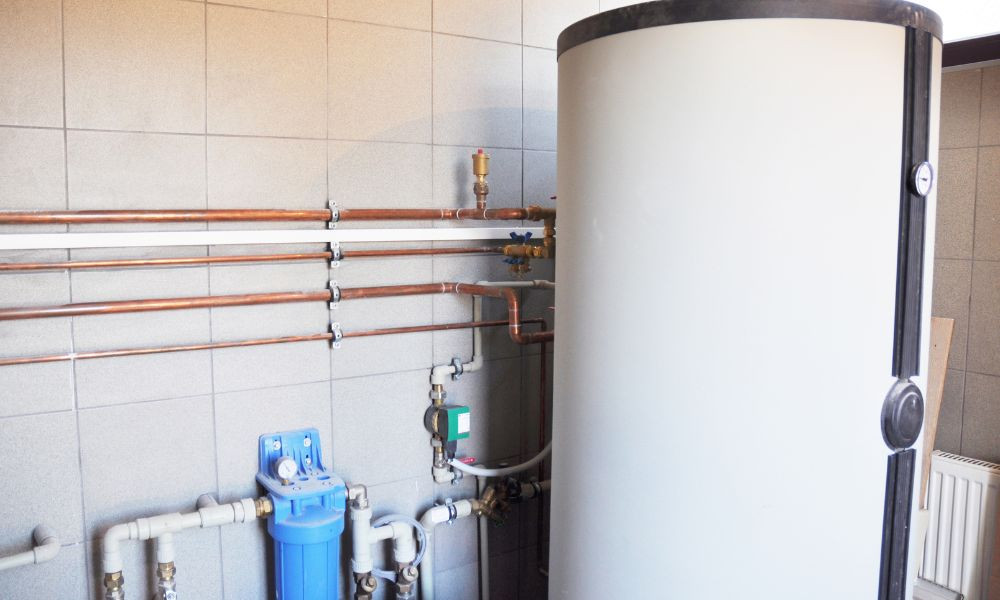Everything To Know About Geothermal Hot Water Systems
A geothermal heating system is just what it sounds like: a method of heating a building—and the water inside it—by utilizing natural heat that’s stored underground. Instead of burning fuel like oil or gas, a geothermal heat system simply moves existing heat from one location to another. These systems are popular with homeowners and business owners who want to reduce their carbon footprint and save money on monthly energy bills.
Before you install a geothermal system, though, it would benefit you to learn how they work and why a consumer may want one installed. Here’s everything you need to know about geothermal hot water systems, from how they work to why they’re so appealing.
How a Geothermal Heating System Works
Geothermal heat systems are comprised of three main parts:
- The geothermal unit, or heat pump
- A series of underground pipes filled with liquid, configured in an open or closed loop
- The ductwork that transfers heated or cooled air into the building
Step One
First, the geothermal pump circulates liquid through the pipes that are buried underground. The liquid will transfer heat from the ground into the home heating system, or vice versa.
Step Two
Those loops of liquid-filled piping that are buried in the ground will absorb heat that is stored underground. Between 4 and 6 feet underground, the temperature stays at a relatively stable 50 degrees Fahrenheit.
Step Three
Once the liquid in those pipes has heated up, it moves back toward the geothermal pump and transfers heat to it. Geothermal systems can provide heated and cooled air to a building, as well as convenient hot water for the plumbing system.
Winter vs. Summer
Geothermal pumps aren’t just for heating air and water; they can also cool a home or office space without using excess energy.
In the winter, the geothermal system transfers heat from the ground to the liquid-filled pipes running through it. However, in the summer, consumers can reverse that loop to take excess heat away from the indoors and release it underground. Geothermal systems can act as both a furnace and an air conditioner at a fraction of the cost of both.
Common Types of Geothermal Pump Systems
Most geothermal heat pumps use a closed-loop system for those pipes that run underground and collect or disperse heat. There are three closed-loop pump systems commonly used in conjunction with geothermal heating and cooling, plus one open-loop option.
Horizontal
Many residential property owners have their pipes installed horizontally, as there’s generally more land available for those pipes to spread out. Pipes are laid out in shallow coils, buried about 6 feet underground.
Good To Know:
Horizontal geothermal pipe installation is often more cost-effective than the vertical configuration, as installers don’t have to dig nearly as deep into the ground.
Vertical
Commercial buildings often choose a vertical pipe layout since they usually have less square footage of ground outside to put down those pipes. In a vertical configuration, pipes must be buried between 100 and 400 feet underground.
Lake or Pond System
Is there a small pond or lake on the property that’s switching to geothermal heat? A pond-based geothermal system draws heat from water instead of soil. Installers affix coils of piping to racks that they place about 10 feet underwater.
Open-Loop Systems for Well Water
Most geothermal pump systems work with a closed loop of coiled piping. However, if the property’s water supply comes from a well, you may be able to connect the geothermal pump to it with an open loop. Well water moves through the system in one direction, then back into the ground through a discharge pipe.
Costs Associated With Geothermal Heating Systems
Many individuals who opt to have a geothermal pump installed do so partially because geothermal heat is very cost-effective in the long run. Consumers will save a bundle on fuel because a geothermal system doesn’t burn any. However, there are a few startup costs associated with installing a geothermal pump.
Installing a geothermal system can cost upward of $10,000 due to the complexity of the piping and the need to dig deep into the ground. Geothermal system installation is more costly than installing a traditional HVAC system, but those costs come back to the consumer in monthly energy savings. Within a decade, the average geothermal heat user will have recouped the installation costs of the pump and piping system.
Benefits of Geothermal Heating and Cooling
We’ve already discussed the energy savings associated with using geothermal heat. What are some other compelling reasons for consumers to switch to a geothermal heating and cooling system?
Harnesses Renewable Energy
With a geothermal hot water system, there’s no fuel source being burned; the heat comes from the sun, which is perhaps the greenest energy source of all. Geothermal systems take advantage of a process that already occurs in nature by moving the heat stored underground to a home or business.
Runs Quietly
Geothermal heating and cooling is much quieter and subtler than a traditional HVAC system. When it’s running as intended, a geothermal system is only about as loud as a refrigerator.
Very Low Maintenance
The components of a geothermal heating and cooling system are designed to last for decades. The indoor elements require very little maintenance and can last for more than 25 years. Those pipes buried underground in the loop can last for over 50 years, as they’re highly protected from the elements.
Safer Than the Competition
Because geothermal heating and cooling systems work with the heat of the sun, there’s no combustion reaction involved. Geothermal systems do not carry a fire risk with them, and they won’t release carbon monoxide into the air as they work.
Are you working on a residential or commercial property with the goal of installing a geothermal hot water system? This guide from 24hr Supply offers everything you need to know about geothermal heating and cooling. The benefits of a home gas water heater cannot be overstated, but if you have a client who wants an environmentally friendly solution to heating, cooling, and hot water, consider recommending a geothermal pump system.
Recent Posts
-
How To Diagnose Common Tankless Water Heater Problems
The allure of endless hot showers and the promise of reduced energy bills have made tankless water h …May 3rd 2024 -
Understanding Boiler Types and Applications
Navigating the world of boilers might not be your everyday adventure, but it’s a journey worth takin …May 2nd 2024 -
The Role of Sewage Pumps in Flood Prevention
With their capacity to devastate communities, disrupt lives, and cause extensive damage, floods dema …Apr 19th 2024





